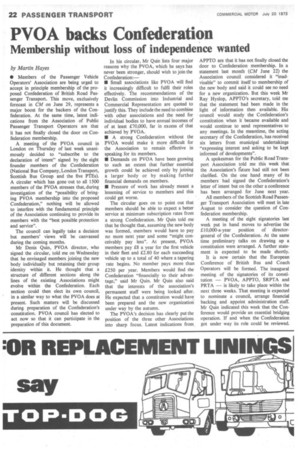PVOA backs Confederation
Page 24

If you've noticed an error in this article please click here to report it so we can fix it.
Membership without loss of independence wanted
by Martin Hayes • Members of the Passenger Vehicle Operators' Association are being urged to accept in principle membership of the proposed Confederation of British Road Passenger Transport. This move, exclusively forecast in CM on June 29, represents a major boost for the backers of the Confederation. At the same time, latest indications from the Association of Public Passenger Transport Operators are that it has not finally closed the door on Confederation membership.
A meeting of the PVOA council in London on Thursday of last week unanimously decided to "subscribe to the declaration of intent" signed by the eight founder members of the Confederation (National Bus Company, London Transport, Scottish Bus Group and the five PTEs). A circular which has gone out to all 1500 members of the PVOA stresses that, during investigation of the "possibility of bringing PVOA membership into the proposed Confederation," nothing will be allowed to interfere with the fundamental principle of the Association continuing to provide its members with the "best possible protection and service".
The council can legally take a decision but members' views will be canvassed during the coming months.
Mr Denis Quin, PVOA director, who signed the circular, told me on Wednesday that he envisaged members joining the new body individually but retaining their group identity within it. He thought that a structure of different sections along the lines of the existing Associations might evolve within the Confederation. Each section could then elect its own council, in a similar way to what the PVOA does at present. Such matters will be discussed during preparation of the Confederation's constitution, PVOA council has elected to act now so that it can participate in the preparation of this document. In his circular, Mr Quin lists four major reasons why the PVOA, which he says has never been stronger, should wish to join the Confederation:— • Small associations like PVOA will find it increasingly difficult to fulfil their roles effectively. The recommendations of the Devlin Commission into Industrial and Commercial Representation are quoted to justify this. They include the need to combine with other associations and the need for individual bodies to have annual incomes of of at least £70,000, far in excess of that achieved by PVOA.
• A strong Confederation without the PVOA would make it more difficult for the Association to remain effective in speaking for its members.
• Demands on PVOA have been growing to such an extent that further essential growth could be achieved only by joining a larger body or by making further financial demands on members.
• Pressure of work has already meant a lessening of service to members and this could get worse.
The circular goes on to point out that members should be able to expect a better service at minimum subscription rates from a strong Confederation. Mr Quin told me that he thought that, assuming the new body was formed, members would have to pay no more next year and some "might conceivably pay less". At present, PVOA members pay £8 a year for the first vehicle in their fleet and £2.80 for each succeeding vehicle up to a total of 40 where a tapering rate begins. No member pays more than £250 per year. Members would find the Confederation "financially to their advantage," said Mr Quin. Mr Quin also said that the interests of the association's permanent staff were being looked after. He expected that a constitution would have been prepared and the new organization under way by the autumn.
The PV0A's decision has clearly put the position of the three other Associations into sharp focus. Latest indications from APPTO are that it has not finally closed the door to Confederation membership. In a statement last month (CM June 22) the Association council considered it "inadvisable" to commit itself to membership of the new body and said it could see no need for a new organization. But this week Mr Ray Hyslop, APPTO's secretary, told me that the statement had been made in the light of information then available. His council would study the Confederation's constitution when it became available and would continue to send representatives to any meetings. In the meantime, the acting secretary of the Confederation, has received six letters from municipal undertakings "expressing interest and asking to be kept informed of developments".
A spokesman for the Public Road Transport Association told me this week that the Association's future had still not been clarified. On the one hand many of its members had signed the Confederation's letter of intent but on the other a conference has been arranged for June next year.
All members of the Scottish Road Passenger Transport Association will meet in late August to consider the question of Confederation membership.
A meeting of the eight signatories last week put in hand moves to advertise the £10,000-a-year position of directorgeneral of the Confederation. At the same time preliminary talks on drawing up a constitution were arranged. A further statement is expected to be made shortly.
It is now certain that the European Conference of British Bus and Coach Operators will be formed. The inaugural meeting of the signatories of its constitution — PVOA, APPTO, SRPTA and PRTA — is likely to take place within the next three weeks. That meeting is expected to nominate a council, arrange financial backing and appoint administration staff. Mr Quin indicated this week that the Conference would provide an essential bridging operation. If and when the Confederation got under way its role could be reviewed.




































































































